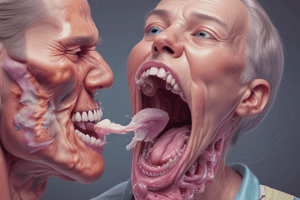Podcast
Questions and Answers
What is the duration of the swallowing process?
What is the duration of the swallowing process?
- 10-12 seconds
- 5-7 seconds
- 15-20 seconds
- 8-10 seconds (correct)
Which of the following conditions is NOT a cause of dysphagia?
Which of the following conditions is NOT a cause of dysphagia?
- Alzheimer disease
- Cricopharyngeal dysfunction
- Scleroderma
- Asthma (correct)
Which phase of swallowing involves the preparation of the bolus?
Which phase of swallowing involves the preparation of the bolus?
- Oral phase (correct)
- Pharyngeal phase
- Esophageal phase
- Gastric phase
Which of the following is NOT included in the history review when evaluating dysphagia?
Which of the following is NOT included in the history review when evaluating dysphagia?
What imaging study is excellent for evaluating dynamic swallowing?
What imaging study is excellent for evaluating dynamic swallowing?
Which of the following is considered a structural disorder that can lead to dysphagia?
Which of the following is considered a structural disorder that can lead to dysphagia?
Which cranial nerve is NOT typically evaluated during a physical exam for dysphagia?
Which cranial nerve is NOT typically evaluated during a physical exam for dysphagia?
Which medication category is linked to causing dysphagia?
Which medication category is linked to causing dysphagia?
Flashcards
Phases of Swallowing
Phases of Swallowing
The swallowing process is divided into three stages: oral, pharyngeal, and esophageal. The entire process typically takes about 8-10 seconds.
Oral Preparation of Bolus
Oral Preparation of Bolus
Before swallowing begins, the food or liquid is prepared in the mouth by chewing and mixing with saliva to form a bolus.
What is Dysphagia?
What is Dysphagia?
Dysphagia refers to difficulty swallowing. It can be caused by a variety of factors, including structural abnormalities, neurological disorders, and motility problems.
Foreign Bodies in Dysphagia
Foreign Bodies in Dysphagia
Signup and view all the flashcards
Surgical Causes of Dysphagia
Surgical Causes of Dysphagia
Signup and view all the flashcards
Oesophagitis and Dysphagia
Oesophagitis and Dysphagia
Signup and view all the flashcards
Tumors and Dysphagia
Tumors and Dysphagia
Signup and view all the flashcards
CNS Disorders and Dysphagia
CNS Disorders and Dysphagia
Signup and view all the flashcards
Study Notes
Dysphagia
- Dysphagia is difficulty swallowing
- Swallowing involves three phases: Oral, Pharyngeal, and Esophageal
- Swallowing typically takes 8-10 seconds
- Oral preparation of the bolus must occur before swallowing begins
Physiology of Swallowing
- The act of swallowing involves three phases: Oral, Pharyngeal, and Esophageal
- Swallowing takes about 8-10 seconds
- Before swallowing begins, Oral Preparation of the bolus must occur.
Causes of Dysphagia
- Foreign bodies
- Surgical causes: Head and neck surgery
- Oesophagitis (GERD, infectious, radiation-induced, drug-induced)
- Tumors: oropharynx, hypopharynx, larynx, esophagus
- CNS disorders: Alzheimer's disease, Brain tumors, Guillain-Barré syndrome, Amyotrophic lateral sclerosis (ALS)
- Motility disorders: Diffuse esophageal spasms (DES), Achalasia, Scleroderma, Presbyesophagus, Cricopharyngeal dysfunction.
- Structural disorders: Zenker's diverticulum, Plummer-Vinson or Paterson-Kelly syndromes
Evaluation of Dysphagia
- History: Duration of dietary changes, weight loss, odynophagia (painful swallowing), solids or liquids, level of sensation, past surgery/trauma/caustic ingestion, associated symptoms (GERD, voice changes, nasal leakage, otalgia)
- Review of Systems: Tobacco/alcohol use, medications (antihistamines, anticholinergics, antidepressants, antihypertensives), osteoarthritis, systemic neuromuscular disorders, auto-immune disorders, psychiatric state
- Physical Exam (General mental status, drooling, wheezing, dyspnea, voice quality, Cranial nerves, Inspection of the tongue and palate for strength/symmetry, Laryngeal Examination for pooled secretions, vocal cord movement)
- Imaging Studies: Plain X-ray, Barium Swallow (Excellent for dynamic swallow disorders), Manometry (for disorders where intraluminal pressures need measuring), Fiberoptic Endoscopic Evaluation of Swallowing (FEES), Esophageal Ultrasound, Endoscopic assessment of esophageal tumors, CT Scan & MRI
Treatment of Dysphagia
- Identify and treat the cause.
- The goals of treatment are to maintain adequate nutritional intake and maximize airway protection.
Studying That Suits You
Use AI to generate personalized quizzes and flashcards to suit your learning preferences.




